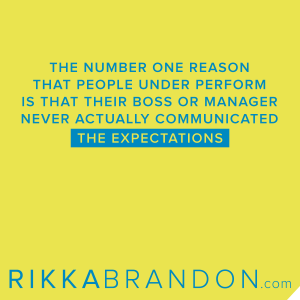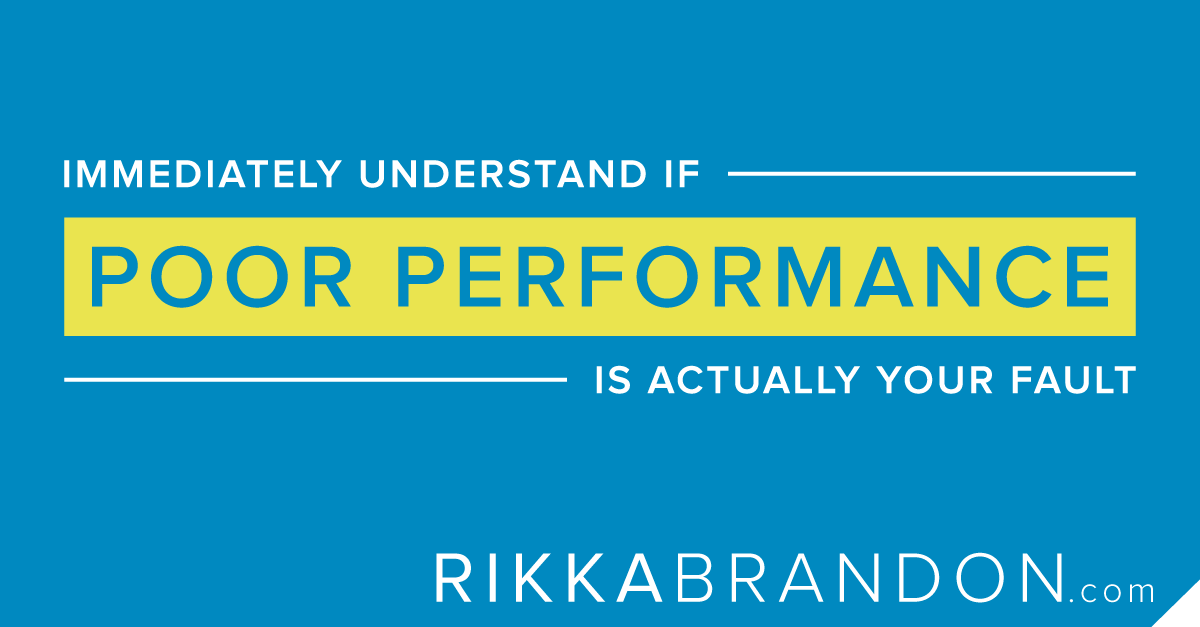Few things are as frustrating to a leader as when a team member isn't performing.
It is easy to assume you are blameless, but under performance can be a two-way street.
If you think you are ready to have a difficult conversation, take a few minutes to see if you are part of the problem.
Transcript
Today, we’re going to talk about “Is is you, or is it me?” How to know whose fault it actually is when an employee is under-performing.
This is a topic near and dear to my heart, because when I had a lot of employees and a lot of them were under-performing, I was also really deep into my self-help improvement and was figuring out every way I could improve myself, so I found a thousand ways that it was my fault.
I hadn’t given them the most expensive training, I hadn’t had a dedicated training person for my team of ten, and different things like that, where I made everything about how I was failing them, not that they weren’t doing the job.
It was exhausting. It was super exhausting, actually, and I want to stop other entrepreneurs from going through that.
One of the ways that you can really get clear about “Is it them or is it you?” is did you set clear expectations?
Do they know what they’re supposed to be doing day in and day out? That doesn’t just mean increase sales by 10%; that means what are the activities – how many phone calls, how many appointments, whatever it is they need to do on a daily, weekly and monthly basis, did you tell them that so they know what they need to do to be successful?
If you haven’t done that, you need to do it now.
The number one reason that people under perform is that their boss or manager never actually communicated the expectations.

Flat out, right there, that solves 80% of the problems people have by actually clearly articulating activity expectations.
Now don’t get me wrong, that doesn’t mean everybody is going to hit those activity expectations. But now you know, “Okay, they don’t even care enough to hit the activity expectations,” or if they’re hitting the activity expectations and still not getting the results, then it’s maybe how they’re actually doing the work.
So you know where to start to coach and improve them.
Step one is did you set clear activity expectations?
Step two is are you asking if they need support?
Are you talking to them about the lack of performance? If you don’t have expectations set, this could be a little bit awkward, so you might need to wait to have this conversation until you’ve set some expectations, and then you can address the lack of hitting them. Or hopefully just start off work with them and build expectations out together.
That is really the number one way that you can decide if it’s you or it’s them. If you have clear expectations and the person is not meeting them, they’re making a choice not to meet them.
You know, part of this is if your expectations are completely unreasonable – like 112 calls a day – you would want to give them the space to tell you that. But I’m going to assume that you’re creating reasonable goals that they can achieve and they’re choosing not to.
Well, that’s a very conscious choice on someone’s part not to do what is required of them for their job. I don’t think that we need to keep people like that on our team. They can go work for somebody else, ideally a big company that can afford to float people who aren’t going to do what’s needed for the business to succeed.
The number one thing is to set and communicate expectations. If you need help with this or you’re feeling stuck, you should check out my Clarity and Reality course. It’s all about creating job descriptions, setting expectations and being able to communicate them so you get the best results from your employees.
I hope this helps!
Love this post? Be the first among your friends to share it on Facebook, Tweet it, or Pin it on Pinterest!


Recent Comments